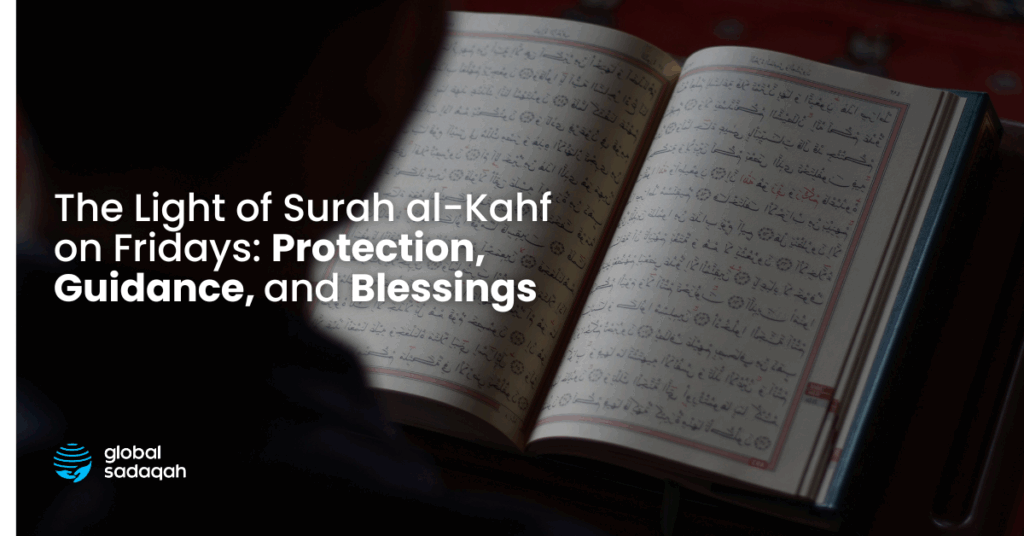Friday is a day unlike any other. In Islam, it is the most honored day of the week, filled with mercy, forgiveness, and multiplied rewards. Among the many recommended practices on this sacred day is the recitation of Surah al-Kahf. For centuries, Muslims have held to this Sunnah, finding comfort and guidance in its verses. But beyond tradition, there are profound reasons why the Prophet ﷺ emphasized the importance of reciting this Surah every Friday.
A Sunnah that Illuminates the Week
The Prophet ﷺ said:
“Whoever reads Surah al-Kahf on the day of Jumu‘ah, a light will shine for him between the two Fridays.” (al-Bayhaqi, al-Hakim)
This narration highlights something deeply spiritual. The “light” mentioned is more than a symbol; it represents divine guidance, clarity, and protection that carries a believer through the challenges of life until the next Friday arrives. In a world filled with confusion, misinformation, and constant distractions, this light is a reminder that Allah ﷻ equips His servants with tools to stay firm on the straight path. Reciting Surah al-Kahf is not simply about completing a ritual; it is about kindling a spiritual lantern that brightens the days ahead.
A Protection Against Great Trials
Another important hadith sheds light on the role of Surah al-Kahf in protecting believers:
“Whoever memorizes ten verses from the beginning of Surah al-Kahf will be protected from the Dajjal.” (Sahih Muslim)
The trial of the Dajjal is described as the greatest deception humanity will face. While not every generation will live to witness his arrival, deception and misguidance are tests present in every era. In modern times, these come in the form of false ideologies, temptations, and pressures that pull people away from faith. Reciting and internalizing Surah al-Kahf equips the believer with resilience against these trials. Its verses shield the heart from falling into confusion and strengthen the soul to hold onto truth in the face of overwhelming falsehood.
Timeless Lessons in Four Stories
Surah al-Kahf is unique because it contains four remarkable stories, each carrying timeless lessons that are deeply relevant to the challenges of life:
- The People of the Cave – A group of young believers who chose faith over worldly comfort. Their story reflects the courage needed to stand firm when belief is tested. It reassures us that even when society pressures us to compromise, Allah ﷻ protects those who remain steadfast.
- The Man with the Two Gardens – A narrative about wealth and arrogance, teaching that material success is a test, not a guarantee of happiness. Gratitude leads to blessings, while pride and forgetfulness of Allah lead to loss. This story resonates today, as many chase wealth without considering its true purpose.
- Musa (AS) and Khidr – A powerful reminder of patience and humility. Musa’s journey with Khidr shows that divine wisdom often lies beyond human understanding. Life’s trials may seem difficult, but Allah’s plan always carries wisdom, even when hidden from us.
- Dhul-Qarnayn – A story of leadership, justice, and responsibility. Dhul-Qarnayn’s example demonstrates that true power is not about domination, but about protecting people, upholding justice, and serving humanity.
These stories correspond to the trials of faith, wealth, knowledge, and power—the very struggles that continue to shape human life. By revisiting them every Friday, believers are reminded of how to navigate these tests with faith and balance.
Bringing Surah al-Kahf into Your Friday Routine
Making Surah al-Kahf part of Friday does not need to be overwhelming. It is about consistency and reflection. Setting aside a specific time—whether after Fajr, before Jumu‘ah prayer, or in the evening—creates a rhythm that makes the practice sustainable.
Beyond reciting the Surah, it is essential to reflect on its meanings. Choose one lesson from the stories each week and think about how it applies to current struggles or decisions in life. This turns the recitation from a ritual into a source of guidance.
Families can also make Surah al-Kahf part of their Friday tradition. Parents who read it with their children not only pass down a Sunnah but also plant seeds of reflection and resilience in the next generation. For those who struggle with Arabic, listening to recitations or reading translations is a good way to stay connected, ensuring that the Surah becomes both understood and loved.
Conclusion
Friday is more than a day of rest or the start of the weekend—it is a weekly opportunity for renewal. Reciting Surah al-Kahf on this blessed day is a Sunnah that provides light, guidance, and strength for the believer. It is protection against deception, a reminder of life’s tests, and a source of wisdom to navigate the challenges of our time.
The Prophet ﷺ described the believer who recites Surah al-Kahf on Friday as surrounded by light until the next Jumu‘ah. This is a gift of mercy, an invitation to draw nearer to Allah ﷻ, and a chance to carry His light into the week ahead. By committing to this practice, we do more than preserve a Sunnah—we renew our connection with the Qur’an, strengthen our faith, and prepare ourselves for the trials of life with the words of Allah as our guide.

